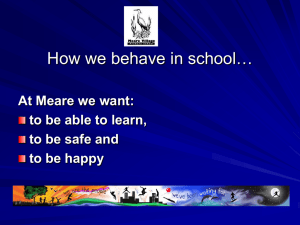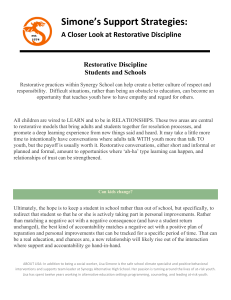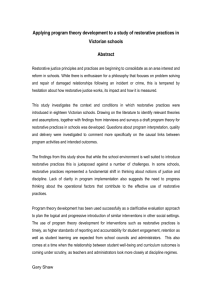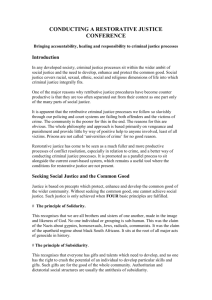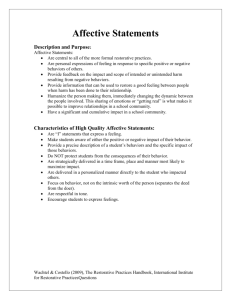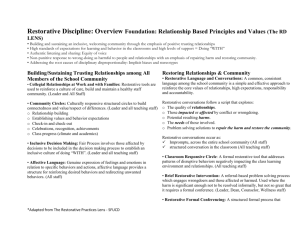Restorative Justice Primary and Secondary legislation for
advertisement
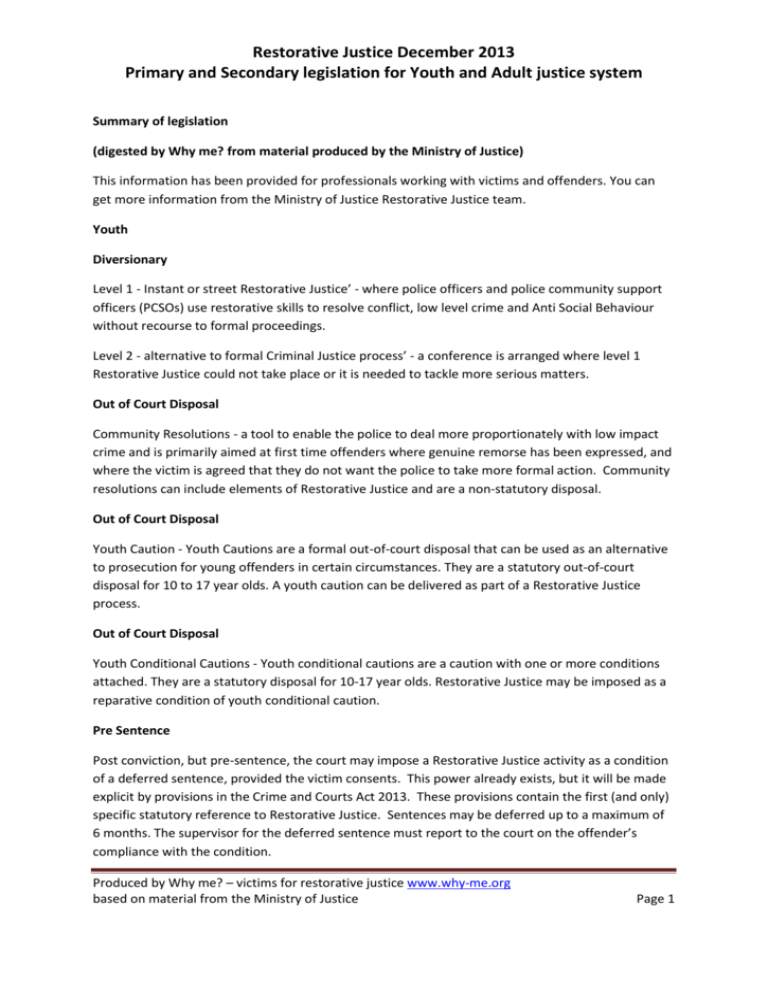
Restorative Justice December 2013 Primary and Secondary legislation for Youth and Adult justice system Summary of legislation (digested by Why me? from material produced by the Ministry of Justice) This information has been provided for professionals working with victims and offenders. You can get more information from the Ministry of Justice Restorative Justice team. Youth Diversionary Level 1 - Instant or street Restorative Justice’ - where police officers and police community support officers (PCSOs) use restorative skills to resolve conflict, low level crime and Anti Social Behaviour without recourse to formal proceedings. Level 2 - alternative to formal Criminal Justice process’ - a conference is arranged where level 1 Restorative Justice could not take place or it is needed to tackle more serious matters. Out of Court Disposal Community Resolutions - a tool to enable the police to deal more proportionately with low impact crime and is primarily aimed at first time offenders where genuine remorse has been expressed, and where the victim is agreed that they do not want the police to take more formal action. Community resolutions can include elements of Restorative Justice and are a non-statutory disposal. Out of Court Disposal Youth Caution - Youth Cautions are a formal out-of-court disposal that can be used as an alternative to prosecution for young offenders in certain circumstances. They are a statutory out-of-court disposal for 10 to 17 year olds. A youth caution can be delivered as part of a Restorative Justice process. Out of Court Disposal Youth Conditional Cautions - Youth conditional cautions are a caution with one or more conditions attached. They are a statutory disposal for 10-17 year olds. Restorative Justice may be imposed as a reparative condition of youth conditional caution. Pre Sentence Post conviction, but pre-sentence, the court may impose a Restorative Justice activity as a condition of a deferred sentence, provided the victim consents. This power already exists, but it will be made explicit by provisions in the Crime and Courts Act 2013. These provisions contain the first (and only) specific statutory reference to Restorative Justice. Sentences may be deferred up to a maximum of 6 months. The supervisor for the deferred sentence must report to the court on the offender’s compliance with the condition. Produced by Why me? – victims for restorative justice www.why-me.org based on material from the Ministry of Justice Page 1 Restorative Justice December 2013 Primary and Secondary legislation for Youth and Adult justice system Post Sentence Youth Referral Order - The powers of the Criminal Courts (Sentencing) Act 2000 (sections 16-32 and schedule 1), where a young person aged 10-17 pleads guilty and is convicted for the first time of an imprisonable offence, the court must pass (in most cases) a referral order. The young person may be required to make restitution or reparation to their victim based on a restorative justice approach. Post Sentence Youth Rehabilitation Order - The Youth Rehabilitation Order (Youth Referral Order) is a generic community sentence for young offenders and combines a number of sentences into one generic sentence. It is the standard community sentence used for the majority of children and young people who offend. An activity requirement can be attached to a Youth Referral Order. Restorative Justice can be delivered through the activity requirement of the Youth Referral Order. Post Sentence Reparation Order - The Reparation Order is a non-custodial sentence of a court available for any young person (10 to 17 years old) who has been convicted of an offence. The Reparation Order will require the young offender to make specific reparation either to the individual victim of his crime, where the victim desires this, or to the community, which they have harmed. Adults Diversionary Level 1 - Instant or street Restorative Justice’ - where police officers and police community support officers (PCSOs) use restorative skills to resolve conflict, low level crime and Anti Social Behaviour without recourse to formal proceedings. Level 2 - alternative to formal Criminal Justice process’ - a conference is arranged where level 1 Restorative Justice could not take place or it is needed to tackle more serious matters. Out of Court Disposal Community Resolutions - a tool to enable the police to deal more proportionately with low impact crime and is primarily aimed at first time offenders where genuine remorse has been expressed, and where the victim is agreed that they do not want the police to take more formal action. Community resolutions which can include elements of Restorative Justice and are a non-statutory disposal. Out of Court Disposal Adult Conditional Caution - a caution with one or more conditions attached. They are a statutory disposal. A Restorative Justice activity may form part of a reparative condition of an adult conditional caution. Produced by Why me? – victims for restorative justice www.why-me.org based on material from the Ministry of Justice Page 2 Restorative Justice December 2013 Primary and Secondary legislation for Youth and Adult justice system Pre Sentence Post conviction, but pre-sentence, the court may defer sentence to allow for a Restorative Justice activity to take place, by imposing a restorative justice requirement. The victim and offender must consent. This power already exists, but it will be made explicit by provisions in the Crime and Courts Act 2013. These provisions contain the first (and only) specific statutory reference to Restorative Justice. Sentences may be deferred up to a maximum of 6 months. The supervisor for the deferred sentence must report to the court on the offender’s compliance with the condition. Post Sentence Community Order and Suspended Sentence Order - At court a judge or magistrate may specify that the offender undertakes a Restorative Justice activity as part of a community order under the Specified Activity Requirement (SAR) in Section 201 of the Criminal Justice Act 2003. The victim’s consent is required. Once the provisions of the Offender Rehabilitation Bill 2013 are in force, clause 15 introduces the new ‘rehabilitation activity requirement’ as part of a community order or SSO, which merges the existing activity and supervision requirement. Under this new requirement, the responsible officer may instruct offenders to participate in activities whose purpose is reparation – where the victim consents this could include Restorative Justice activities. Note that under this new requirement, the court will no longer be able to mandate any form of Restorative Justice because the activities are left to the discretion of the responsible officer. Produced by Why me? – victims for restorative justice www.why-me.org based on material from the Ministry of Justice Page 3
